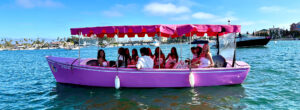Introduction
As environmental awareness continues to grow, so does the popularity of eco-friendly recreational options like electric boat rentals. These innovative vessels offer a way to enjoy the beauty of marine and lake environments without the environmental costs associated with traditional gasoline-powered boats. This article delves into why electric boat rentals are not just a leisure activity but a significant step towards sustainable tourism and a cleaner, quieter, and more responsible way to explore natural waterways.
Electric boats are designed with the eco-conscious cruiser in mind, providing a silent, emission-free experience that significantly reduces the impact on the ecosystems they navigate. By choosing electric boat rentals, enthusiasts can indulge in their love for the water while supporting environmental conservation efforts. This shift in recreational boating is a testament to the evolving priorities of both consumers and businesses towards greener alternatives.
In the following sections, we’ll explore the various environmental benefits of electric boats, contrast them with the impacts of traditional boating, and highlight how choosing electric can contribute to preserving our planet’s precious water bodies. By understanding these benefits, renters can make informed decisions that align with their environmental values and support the shift toward a more sustainable future.
What Makes a Boat Eco-Conscious?
An eco-conscious boat is defined primarily by its propulsion system. Electric boats operate using electric motors powered by batteries, which can be recharged using conventional power sources or through renewable energy systems such as solar panels. This method of propulsion eliminates the need for fossil fuels, thereby reducing both air and water pollution associated with boating.
Beyond their propulsion systems, electric boats also feature designs that minimize waste and maximize efficiency. Many are built using sustainable materials that are recyclable and environmentally friendly. The overall efficiency of electric motors means less energy consumption per mile traveled compared to gasoline engines, enhancing the boat’s sustainability over its operational lifetime.
Furthermore, electric boats are inherently quieter than their gasoline counterparts. This reduction in noise pollution is a significant aspect of being eco-conscious on the water. Noise pollution can disrupt marine life behaviors and ecosystems, making the quiet nature of electric boats a boon for wildlife conservation efforts alongside their environmental benefits.
The Impact of Traditional Boating on the Environment
Traditional gasoline-powered boats have a noticeable impact on the environment, primarily through their emissions. These boats release significant amounts of CO2 and other pollutants into the atmosphere, contributing to air quality degradation and climate change. Moreover, the risk of fuel leaks and spills poses a serious threat to water quality, endangering aquatic life and the overall health of marine ecosystems.
Noise pollution is another critical issue with traditional boats. The loud engines can be distressing to both wildlife and humans, disrupting natural behaviors and peaceful enjoyment of waterways. The cumulative impact of these noises on marine ecosystems can be substantial, with studies showing altered migration patterns and stressed wildlife populations in busy boating areas.
In addition to air and noise pollution, traditional boating often involves the use of toxic paints and cleaning products that can leach into waterways, further harming the aquatic environment. The maintenance of these boats frequently requires chemicals that are not eco-friendly, perpetuating a cycle of pollution that can be difficult to break without a shift towards more sustainable practices.
Electric Boats and Emission Reduction
One of the most significant advantages of electric boats is their ability to drastically reduce emissions. By operating on electricity, these boats emit no exhaust fumes, which means they do not contribute to the air pollution typically associated with internal combustion engines. This is particularly important in enclosed or sensitive environments like lakes and slow-moving rivers, where pollutants can accumulate and cause long-term ecological damage.
The global push towards reducing carbon footprints finds a strong ally in electric boating. When charged from renewable energy sources, electric boats can operate virtually carbon-neutral. This shift is not just beneficial for the environment but also for the boating industry’s sustainability goals, aligning with broader environmental regulations and public expectations for cleaner recreational options.
Moreover, the absence of oil and fuel in the operation of electric boats means there is no risk of spills or leaks, which are among the most direct and harmful impacts of traditional boating on water quality. This not only protects the water bodies but also ensures cleaner swimming conditions and safer habitats for aquatic life, contributing to healthier ecosystems where both humans and wildlife can thrive.
Preserving Water Quality
Electric boats contribute significantly to preserving water quality by eliminating the pollutants that gasoline engines often discharge. These pollutants can lead to oxygen depletion in water bodies, which harms fish and other aquatic organisms. Electric boats leave the water they travel through undisturbed chemically, which is essential for the conservation of delicate marine ecosystems.
Another aspect of water quality preservation is the reduced need for antifouling paints, which are often used on traditional boats to prevent the growth of algae and barnacles. These paints contain heavy metals and other harmful chemicals that can leach into the water. Electric boats often require less aggressive hull treatments due to their cleaner operation and reduced exposure to corrosive elements like oil and gas residues.
Furthermore, the gentle operation of electric boats minimizes their physical impact on water bodies. Unlike high-speed gasoline boats that can cause significant wake and erosion along shorelines, electric boats typically cruise at slower speeds, resulting in less disturbance to shoreline habitats and sediment. This consideration helps maintain natural shore structures and supports the health of coastal and riparian plant species.
Noise Pollution and Marine Life
The impact of noise pollution on marine ecosystems is profound. Traditional motorboats generate significant underwater noise that can disrupt the communication, feeding, and navigation of aquatic species. In contrast, electric boats operate almost silently, minimizing acoustic disturbances and creating a more peaceful environment for both marine life and humans.
This reduction in noise pollution is particularly important in breeding and feeding areas, where disturbances can have critical consequences for wildlife populations. Quieter waters allow marine creatures to behave more naturally, which supports healthier, more resilient ecosystems. For species that rely on sonar and acoustic signals, such as dolphins and some fish, the quieter environment can make a significant difference in their ability to thrive.
Moreover, the quiet nature of electric boats enhances the overall boating experience. Couples, families, and nature watchers can enjoy the sounds of the water and wildlife without the overpowering roar of a gasoline engine. This makes electric boating not only an eco-friendly choice but also a more immersive and enjoyable way to experience the natural world.
Energy Efficiency and Sustainability
Electric boats are not only beneficial for their environmental impact but also for their energy efficiency. Electric motors convert over 90% of the electrical energy from the grid to power at the propeller, which is significantly more efficient than the energy conversion rates of gasoline engines. This efficiency means that electric boats can provide the same or better performance using less energy, which translates to longer durations on the water with less environmental impact.
Many electric boat models are now designed to be charged with renewable energy sources, such as solar panels, which can be installed on the boat or at docking stations. This integration further enhances the sustainability of electric boating, offering a completely green boating solution. As renewable energy becomes more widespread and accessible, electric boats stand to benefit from advancements in technology, potentially leading to even greater efficiencies and lower costs.
The sustainability of electric boats is also evident in their maintenance requirements. Electric motors have fewer moving parts than traditional gasoline engines, which means they require less maintenance and are less likely to need repairs that could involve hazardous materials. This not only reduces the boat’s overall environmental footprint but also lowers the long-term cost of ownership, making electric boating a smart choice economically and environmentally.
Maintenance and Environmental Impact
Electric boats require significantly less maintenance compared to traditional boats, largely due to the simplicity and durability of electric motors. With fewer moving parts and no need for oil changes, the maintenance of electric boats involves less potential for environmental contamination. This reduced maintenance requirement not only lessens the chance of pollutants entering the water but also decreases the overall lifecycle cost of the vessel.
The materials used in electric boats are often more sustainable than those used in traditional boats. Manufacturers increasingly opt for recycled materials or sustainable sources for boat construction, further decreasing the environmental impact. Additionally, the longevity of electric motors and their components means fewer resources are consumed over the boat’s operational life.
End-of-life considerations for electric boats also tend to be more environmentally friendly. Many components of electric boats, including batteries, can be recycled or repurposed, reducing waste and encouraging a circular economy in the boating industry. By designing boats and components that can be easily disassembled and recycled, manufacturers are taking responsibility for the environmental impact of their products throughout their lifecycle.
Supporting Green Innovation
Choosing electric boat rentals not only provides a direct environmental benefit but also supports the broader green innovation industry. As demand for eco-friendly recreational options increases, it encourages companies to invest in sustainable technologies and green business practices. This market-driven encouragement aids in the development of new technologies that can make electric boats even more efficient and accessible.
Investing in electric boat rentals also sends a strong message to policymakers and the industry about consumer preferences for sustainable practices. This can lead to increased regulatory support for environmentally friendly boating solutions and potentially provide incentives for further innovation in the sector. As the market for electric boats grows, it helps establish a sustainable model of tourism that can be replicated in other areas of recreational and commercial boating.
Furthermore, by choosing electric boats, consumers are part of a cultural shift towards sustainability. This choice not only impacts the environment positively but also influences peers and communities, spreading awareness and encouraging others to make eco-friendly choices in their recreational activities. Each rental is a vote for a cleaner, quieter, and more sustainable way to enjoy our planet’s beautiful waterways.
Conclusion
Electric boat rentals represent a significant advancement in eco-friendly recreation, offering a sustainable alternative to traditional boating that benefits both the environment and the boating experience. By choosing electric boats, individuals can enjoy the natural world in a way that preserves it for future generations, making a positive impact on the environment while indulging in their passion for the water.
The adoption of electric boats is about more than just minimizing harm; it’s about actively contributing to the health of our planet’s ecosystems. These boats help maintain cleaner air and water, reduce noise pollution, and support sustainable practices throughout the boating industry. As this trend continues to grow, it promises to reshape boating into an activity that aligns with the values of conservation and sustainability.
For those looking to combine their love of boating with their environmental ethics, electric boat rentals offer the perfect solution. They provide a practical, enjoyable, and environmentally responsible way to explore waterways, ensuring that boating adventures leave a positive legacy. Embrace the eco-conscious cruiser within by choosing electric boat rentals for your next aquatic adventure, and be part of the movement towards a greener, more sustainable future.
Excited for an adventure with us or have a question? Call us at: (949) 675-8433 Book Your Ride with us: Click here to Book



